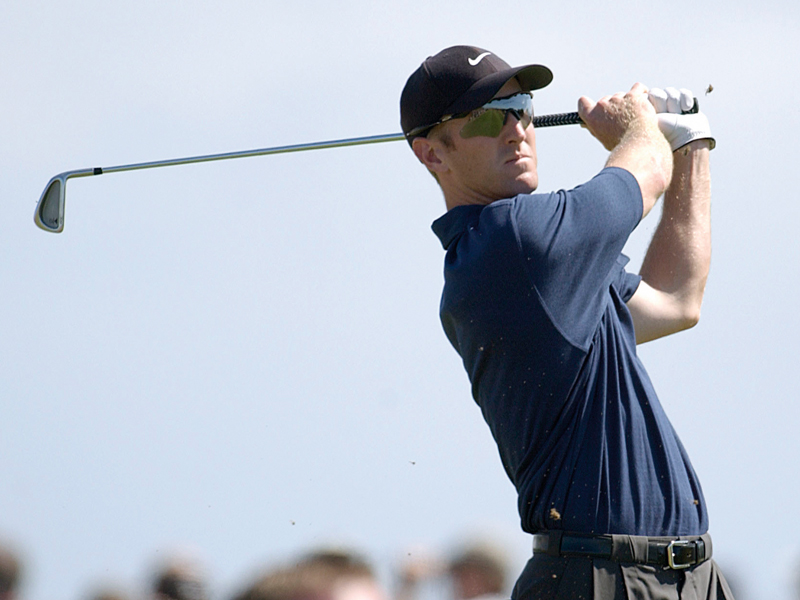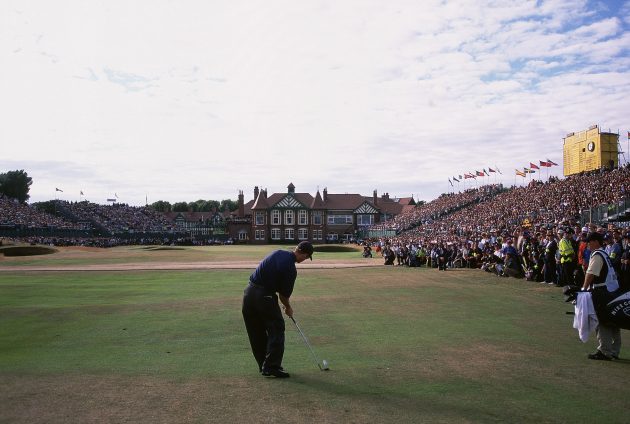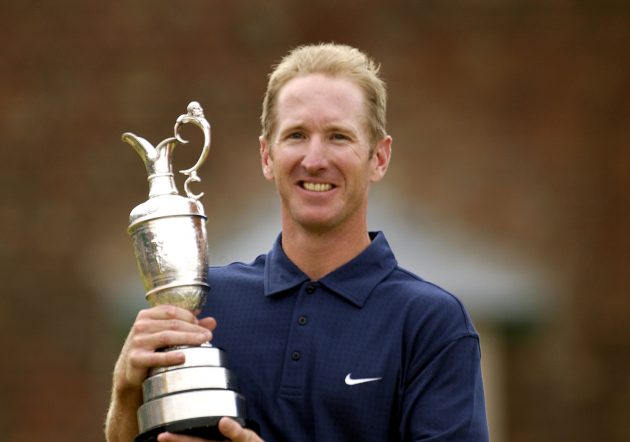David Duval - One Of The Greats
Once the world's best player, we recall David Duval's finest moment at the 2001 Open Championship

For a while he was the world's best, and then David Duval slipped into golfing obscurity after hitting the heights at the 2001 Open
David Duval - One Of The Greats
It’s hard to believe that two decades ago David Duval was hailed as the world’s best player after winning 11 PGA Tour events from 1997 to mid 1999. Hard to believe for many reasons but essentially because since lifting the Claret Jug at Royal Lytham & St Annes in 2001, you can count the number of times he has been of any real relevance on a Sunday leaderboard with the fingers on one hand.
Great players come and go but there is something more disturbing and equally sad about Duval’s plight. Indeed, Duval eulogies have become a prominent feature within the world of the printed press, who recall with glee his most prominent days in the game when he was a constant menace as well as a niggling thorn in the side of the once all-conquering Tiger Woods.
Wherever Duval went, he was a contender, and he always seemed to deliver. Blessed as being one of the game’s purest ball-strikers, he could make golf look easy and when he was hot, he was seriously hot.
On top of the ability factor, Duval was noted for his drive and self-confidence, constantly hidden behind his wraparound shades as he stared both course and competitor down with equal defiance.
It was a manufactured demeanour that, much like that of his rival Woods, gave nothing away but it would never afford him the same level of affection. He could at times come across as surly, and there were signs that away from the seclusion of the fairways he wasn’t actually that comfortable with carrying the mantle of being the world’s best player.
Subscribe to the Golf Monthly newsletter to stay up to date with all the latest tour news, equipment news, reviews, head-to-heads and buyer’s guides from our team of experienced experts.
Seemingly never the best talker, some people labelled him arrogant, others called him a loner. Whatever the theory, the only consistent one was that Duval was a serious golfer in every respect.
MAKING HIS MARK
Rather ironically, Duval arrived in the northwest of England in the summer of 2001 playing nowhere near the sort of golf he had in the preceding three seasons. His world number one tag, which he claimed after winning the Players Championship and the Bell South Classic back-to-back in 1999, had long since gone and he hadn’t won on the PGA Tour that year.
But he was still a remarkable golfing force, ranked seventh in the world and capable of tearing up the field with his masterful iron play that was complemented beautifully with the mechanics of an exquisite short game. He had already flirted with contention at the St Andrews’ Millennium Open and his intelligence and understanding of playing links golf was quickly rekindled as he fired himself into the mix with an opening-round two-under-par 69.

Duval aside, the early Lytham leaderboard was hardly scattered with A-list names. Crowd favourite Colin Montgomerie led by three after the first round thanks to a stunning 65. But elsewhere, Woods’ attempts to overpower the course had seen him struggle with the subtleties and demands of the layout, shooting an out-of-sorts 71.
Meanwhile, the rest of the world’s top five players, Phil Mickelson (70), Ernie Els (71), Vijay Singh (70) and Davis Love III (73), failed to muster any sort of run to threaten the higher echelons of the top 10.
Instead, it was left to the likes of Brad Faxon, Mikko Ilonen, Billy Andrade, Joe Ogilvie, Pierre Fulke, Chris DiMarco and Alex Cejka to make up the running alongside Duval and Montgomerie. And, despite Duval falling back on Friday with a rusty-looking 73, a 65 on Saturday catapulted him from 35th place into a four-way tie for the lead, knotted together as the final round loomed with Cejka and European Tour old-timers Ian Woosnam and Bernhard Langer.
Rather inevitably, Monty’s charge had already been blunted with second and third rounds that clocked into the seventies. Then in Sunday’s final round – a day of initial leaderboard congestion – Cejka slipped woefully off the radar with a clumsy 73, Langer played steadily but without fire for an even-par 71, and Woosnam’s hopes went up in smoke – as did the future of his caddie, Myles Byrne – on the second hole when he was docked two shots for having 15 clubs in his bag, the offender being an extra driver!
All of which meant that Duval, in a rather low-key manner, was granted an opening to the Claret Jug and a lead for which he never relinquished. That said, the American, admittedly playing with limited pressure from the chasing pack, produced a faultless 67, displaying all the hallmarks of his watertight game in the process, splitting fairway after fairway and puring home his irons with customary ease.
His only mistake came at the 12th hole, when unable to get up and down from a bunker his bogey allowed Miguel Angel Jimenez to get within one shot. But after rolling in a 7ft birdie putt at the next, and with the Spaniard bogeying both 14 and 15, Duval, with a three-shot lead locked up, navigated his way across the rolling contours of Lytham’s fearsome finish in nonchalant style.
The win guaranteed his legacy could be filed away safely from the ‘Greatest player to never win a Major’ tag that was still looming large over Montgomerie – who finished six strokes back in a tie for 13th.
Watch: The story of the 2001 Open Championship - T
https://www.youtube.com/watch?v=6KlyjCRn-gY
SPOKEN LIKE A GENT
But in many ways, Duval’s defining moment in the game, certainly with British golf fans, was still to come. After tapping in for a two-putt par and a three-shot win over Niclas Fasth, the American, with his Nike baseball cap and perma-shades now removed, addressed the galleries as he accepted the Claret Jug.
Delivered with poise and charm, Duval thanked the British public, spoke of his love for the game on these shores, and regaled them with a story from his early playing days, highlighting the intelligence of golf fans in the UK. Given such poetic license, Duval stood taller than ever before. It was, and still is, one of the most cherished moments in Open Championship history.

And then, like some kind of mythical comic book hero, he was gone; a slide down the rankings taking him to depths as low as 434 just three years later and 882 in 2009 as his game became brittle and decayed due to a series of injuries, swing changes and a well-reported bout of vertigo.
It was an alarming turnaround in fortunes but in many ways it tells its own tale; unmasked and with his guard finally down, Duval would never be the same man in a golfing sense.
Duval’s once-domineering form is long gone and he has since become a very good commentator.
Evidence of that form going was seen at Royal Portrush in the 148th Open Championship where he finished dead last after a 20-over-par 91 in the opening round.
Still, it is good to remember the Duval magic that, for a limited time only, made him one of the finest golfers of his generation.
Expand 13 Things You Didn’t Know About David Duval

13 Things You Didn’t Know About David Duval
Named as a vice-captain for the 2018 Ryder…
Expand David Duval Has 14 On Par-5 Seventh At The Open

David Duval Has 14 On Par-5 Seventh At The Open
After starting well the American had a poor…
Expand Sir Michael Bonallack: Britain’s greatest amateur

Sir Michael Bonallack: Britain’s greatest amateur
A profile of Sir Michael Bonallack - player,…
For all the latest golf news, check the Golf Monthly website and follow our social media channels